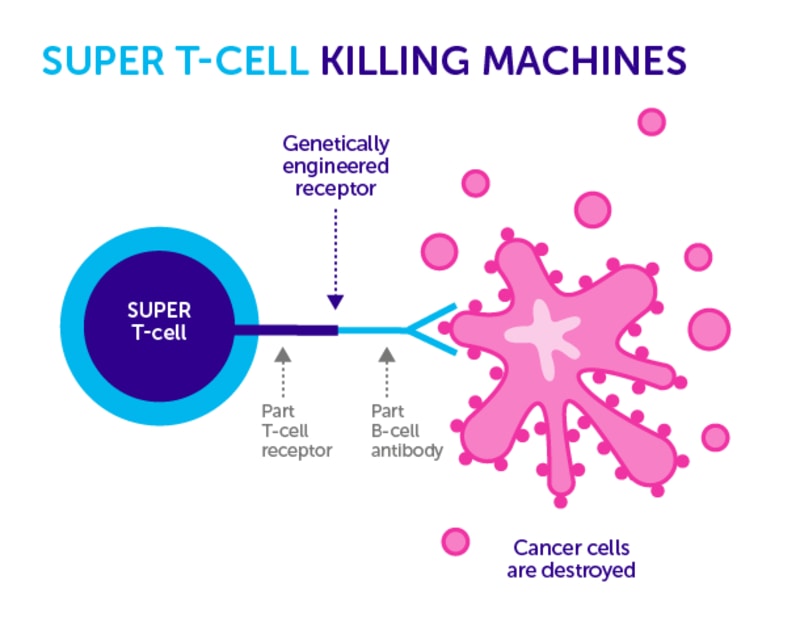Could the key to beating cancer lie within each of us? Scientists at Cardiff University in Wales say they have discovered a T-cell receptor that can find and kill a wide range of cancer cells. Literally, it would be the most natural cancer treatment in the most conventional manner of speaking.
The findings were published Jan. 20, 2020, in Nature Immunology. The researchers believe these T-cell receptors have “enormous potential,” even though their theory has not been tested on humans. (1)
A new type of immune cell which kills most cancers has been discovered by #CardiffUni scientists, offering fresh hope of universal treatment for all patients.
Find out more https://t.co/PAsZTOV8nc pic.twitter.com/s2WAcw1ytd
— Cardiff University (@cardiffuni) January 20, 2020
The immune system is our body’s natural defense against infection. It also attacks cancerous cells, which is why the researchers were looking for ways the immune system naturally attacks tumors. What the discovered was a T-cell – they named it MC.7.G5 – that scans the body to assess potential threats that need to be eliminated.
“There’s a chance here to treat every patient,” researcher Prof. Andrew Sewell told the BBC. “Previously nobody believed this could be possible.
“It raises the prospect of a ‘one-size-fits-all’ cancer treatment, a single type of T-cell that could be capable of destroying many different types of cancers across the population.”
The Cardiff scientists were analyzing blood samples for immune cells when they made the discovery. T-cells generally find it challenging to differentiate tumor cells from healthy tissue because of their similar genetic make-up and usually end up attacking them both. However, the researchers say the new T-cell’s receptor can distinguish between the two. The T-cell kills off the cancerous cells and leaves healthy tissue unscathed.
The scientists noted the MC.7.G5 cells did not grow well in the presence of cancer cells. Instead, it killed them. This was eye-opening and led to testing a variety of cancer types – lung, melanoma, colon, breast, and more – that are activated by different mutations, have various proteins on their surface, and have other differences from one another. (3)
Doctors have been using CAR-T therapy, which involves extracting patients’ immune cells and genetically modifying them. But CAR-T therapy only targets a limited number of cancers – including blood and bone marrow – and has not been successful for solid tumors, which make up the majority of cases.
Cancer usually develops in older people; 80% of all cancers in the United States are diagnosed in people 55 years of age or older. Certain behaviors also increase risk, such as smoking, having excess body weight, and drinking alcohol. In the U.S., approximately 39 out of 100 men and 38 out of 100 women will develop cancer during their lifetime. (4)
The 5-year relative survival rate for all cancers combined has increased substantially since the early 1960s, from 39% to 70% among whites and from 27% to 63% among blacks. Survival varies significantly by cancer type, as well as stage and age at diagnosis.
However, if MC.7.G5 holds promise, the Cardiff team’s discovery will swing the pendulum in humanity’s favor. Still, a word of caution: This “cure” remains in the future; researchers hope to begin the human clinical trial phase later this year.
“Cellular therapies are out there and are working, but only for a minimal number of cancers,” Prof. Sewell said. “[With MC.7.G5] we can use the same approach to treat many different cancers.”
Citations
(1) Genome-wide CRISPR–Cas9 screening reveals ubiquitous T-cell cancer targeting via the monomorphic MHC class I-related protein MR1. https://www.nature.com/articles/s41590-019-0578-8
(2) Immune discovery ‘may treat all cancer’. https://www.bbc.com/news/health-51182451
(3) One immune cell type appears to attack any type of cancer. https://arstechnica.com/science/2020/01/researchers-find-immune-cells-that-seem-to-be-specific-to-cancer/
(4) Cancer Facts & Figures 2019. https://www.cancer.org/content/dam/cancer-org/research/cancer-facts-and-statistics/annual-cancer-facts-and-figures/2019/cancer-facts-and-figures-2019.pdf

